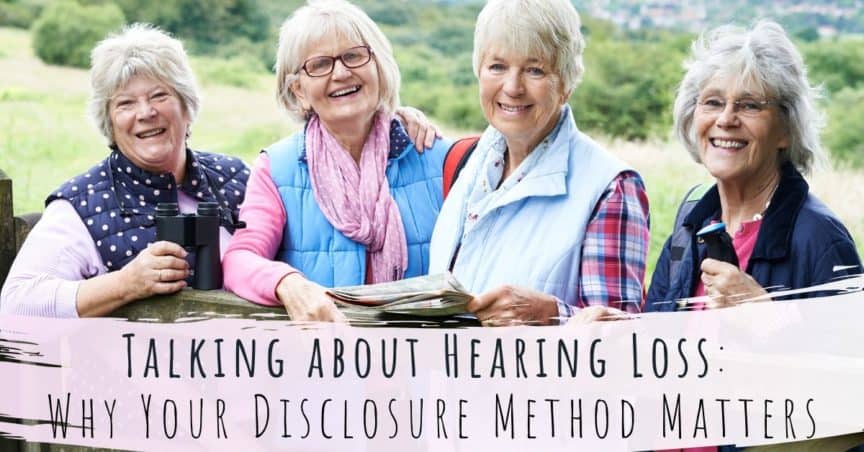- Occupational Hearing Hazards - April 27, 2020
- Understanding Noise-Induced Hearing Loss - April 18, 2020
- Understanding Noise-Induced Hearing Loss - April 12, 2020
Hearing loss is an incredibly common condition, yet some people remain hesitant to disclose their experience with others. Why is this the case? Of the many reasons that some people struggle to talk about their hearing loss, each person has an individual rationale for trying to keep it a secret. Some find it to be tantamount to admitting they are “old” while others would rather not burden others with their struggle. No matter the reason that a person tries to hide hearing loss, the reality is that others are likely to notice. When you are having a conversation, it will probably become clear at some point that there is missing information in the flow back and forth. Recent research shows that it is not only important that you disclose your hearing loss to others but also that it makes a difference how you do it.
Study on Disclosure Methods
Researchers at Massachusetts Eye and Ear conducted a study with 337 adults who have some form of hearing loss. The study asked 15 questions about how these people described their hearing loss to others, pinpointing the actual phrases and terminology used. The results demonstrated that there are three main ways that they disclosed their hearing loss:
- Non-disclosers: The first type of respondent in the survey did not technically disclose their hearing loss at all. When they were forced by circumstances to talk about their condition, they tended to put the emphasis on others. By using phrases like, “Can you speak up?” “I missed that,” or “What was that?” these individuals did not talk about their hearing loss at all. Instead they talked about miscommunication in the same terms that people without hearing loss might do.
- Basis disclosers: The second type of disclosure method let people know that they are hard of hearing. By directly disclosing the basis of the miscommunication, these people had a better chance of overcoming obstacles. Yet, they left their experience at that, sometimes adding a description of the type of hearing loss or the general cause.
- Multipurpose disclosers: The third and final type of disclosure did not stop at admitting to hearing loss. These survey respondents also suggested an accommodation strategy. For instance, they might describe that they hear better in one ear than the other and ask someone to walk on the other side. They might ask someone to come closer to make it easier to talk or to look at them directly. All of these accommodation strategies did not only admit to hearing loss but also pointed toward communication solutions.
Communicating Your Needs
What can be learned from these findings? In the first place, it is more effective to disclose hearing loss than to simply tell someone you missed what was said. By so doing, you aren’t setting the stage for better communication in the future, and your friend or family member might keep talking in a way that is difficult to hear. The second thing we can learn is that it is important to take the next step toward solutions. There are many ways to make communication easier, and you will be surprised how many people will be eager to accommodate your hearing needs once they know how to do so.
Beyond disclosing your hearing loss, even using the multipurpose disclosure method, there is more you can do to help: seek assistance. The first step in the direction of hearing assistance is to get a hearing test with us at Palm Beach Hearing Associates. This brief and painless assessment will be used to see how severe your hearing loss is in a range of sounds. Once you have taken the test, your audiologist or hearing professional will use those results to recommend the right treatment for you.
In conjunction with a consultation about your lifestyle and individual needs, you can be paired with the right set of hearing aids, and the range of options is growing each day. Hearing aids are the best way to make sure that gaps in communication don’t happen any longer. You can use your aids in social settings and as you move through your life, making it possible to converse with ease. Why not take the easy opportunity to schedule a hearing test with us at Palm Beach Hearing Associates today?


